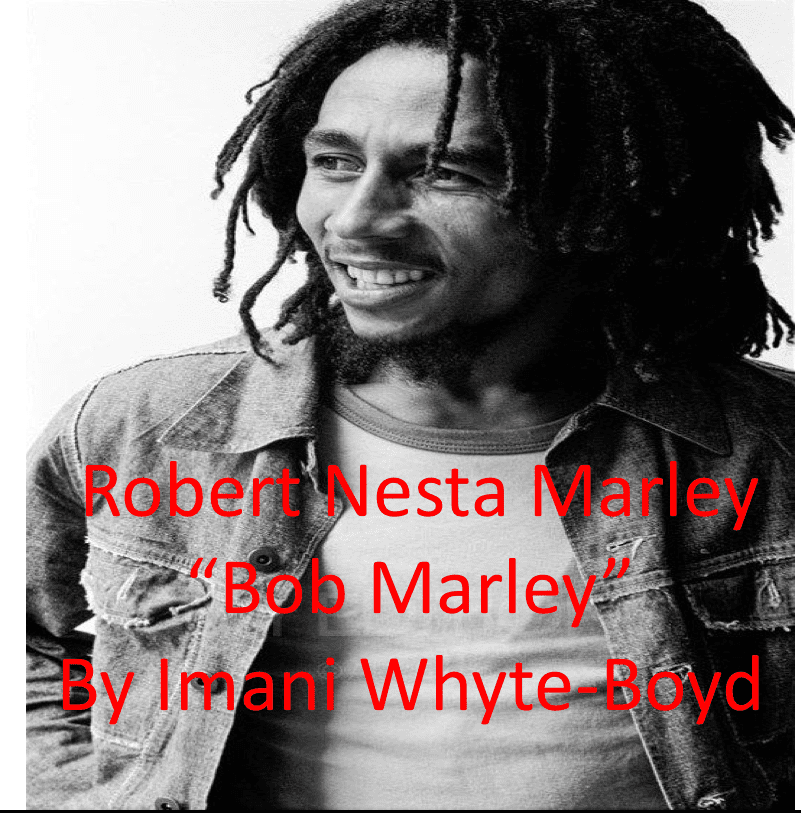
Mike Huckaby
Mike Huckaby is a record producer known for his contributions to Detroit electronic music. Huckaby has produced music on his two labels called Deep Transportation,

International Reggae artist Bob Marley’s personal values of Pan-Africanism and Rastafarianism greatly influenced his motives for being a musician activist. Through his music, Bob Marley promoted awareness of political and social issues especially those faced by African and African American communities.
Robert Nesta “Bob” Marley was a Jamaican singer, songwriter, musician and activist. He was born in Nine Mile in the parish of St. Ann, Jamaica on February 6, 1945 to Norval Sinclair Marley, who served as a captain in the West Indian regiment of the British Army and Sidilla Editha “Cedella Marley” Booker, a Jamaican singer and writer. After Marley’s parents separated at the age of 12 he moved to Trench town, Jamaica with his mother where he became close with singer, songwriter, and percussionist Neville O’Riley “Bunny Wailer” Livingston. Marley’s mother and Bunny’s father Thadeus Livingston had a daughter together which allowed the two young boys to live together. In Stepney Primary and Junior High School, Marley and Bunny began making music. They made a guitar from bamboo, sardine cans, and electrical wire while singer Joe Higgs taught them about harmonies. Their musical explorations furthered to include rhythm and blues as they listening to the radio from New Orleans. They began to combine the sounds of R&B with their own musical style of Caribbean mento and calypso to produce a new music genre known as ska. In the 1960s, “Peter Tosh” McIntosh joined the duo’s musical sessions, introducing a real guitar and forming of what would become the Wailing Wailers.
Upon returning to Jamaica eight months later marked a new stage of musical growth for Marley. He converted to Rastafarianism and began the “mature stage” of his musical career. He created his own record label named Wail N’ Soul alongside Bunny and Peter Tosh. He abandoned the rude-boy ska theme and transitioned to a new type of music known as rock steady to align with his Rastafarian beliefs. Similar to ska, rock steady is still influenced by R&B however it also explores elements of jazz, African and Latin American drums with a slower, offbeat rhythm. The Wailers released an album titled The Best of the Wailers in August 1971 featuring ten songs, five in which were written by Bob Marley. In which included songs, “Soul Captives”, and “Do it Twice”.
The album The Best of the Wailers paved the way for many more albums. During the early 1970s the band recorded an album each year and toured in Europe and America. In 1971, The Wailers recorded Catch a Fire which is noted to be the first successful Jamaican reggae album to be recorded in terms of budget and promotion. 1975 marked another stage of musical growth for Marley. After founding Wailers members Peter Tosh and Bunny left the band, the band was renamed Bob Marley and the Wailers. Marley began to sing songs of a political tone. He debuted his international breakthrough album, No Woman No Cry featuring live material of politics. Followed by his breakthrough album in the United States, Rastaman Vibration in 1976 which included songs such as War and Rat Race written by his wife Rita Marley. While Rastman Vibration reached the Top 50 of the Billboard Soul Charts in America. Marley’s political lyrics began to fuel the turmoil in Jamaica as a result the 1976 elections which caused gang war and division amongst in his hometown of Trench Town, Kingston. Marley’s 1976 song War, a speech written by Ethiopian King, Haile Salassie I incorporated lyrics such as:
“Until the philosophy which hold one race superior and another inferior is finally and permanently discredited and abandoned, Everywhere is war. Me say war
That until there no longer first class and second class citizens of any nation until the color of a man’s skin is of no more significance than the color of his eyes. Me say war.
That until the basic human rights Are equally guaranteed to all, Without regard to race. Dis a war.
That until that day , The dream of lasting peace, World citizenship Rule of international morality Will remain in but a fleeting illusion to be pursued, But never attained – Now everywhere is war – War.
And until the ignoble and unhappy regimes that hold our brothers in Angola, In Mozambique, South Africa Sub-human bondage Have been toppled, Utterly destroyed – Well, everywhere is war – Me say war.
War in the east, War in the west, war up north, War down south – War – war – Rumors of war. And until that day, The African continent will not know peace, We Africans will fight – we find it necessary – And we know we shall win As we are confident In the victory Of good over evil – Good over evil, yeah! Good over evil – Good over evil, yeah! Good over evil – Good over evil, yeah!”.
Bob Marley relocated to England from 1976 to 1979 as a result of the political chaos in Jamaica. During this time Marley recorded hit singles “Waiting in Vain”, “Exodus”, “Jamming” and “One Love”. Bob Marley later returned to Jamaica to perform at the political concert titled One Love Peace Concert in efforts to ease political tension. Marley’s performance marked a significant time in history because it resulted in Jamaica’s two opposing political parties joining together to shake hands. Marley continued his efforts to unify through debuting his 1979 album, Survival. This album featured songs such as “Africa Unite” and “Zimbabwe” which brought awareness to the struggle of Africans and promoted Pan-African solidarity and Black survival. Marley’s final album, Uprising released in 1980 was more religious than political. Nevertheless, it included two of his many popular songs, “Redemption Song” and “Forever Loving Jah”.
Marley often used his platform as a musician to reflect his personal views on love, the injustices of racism and colonialism, Rastafarianism, as well as political and social freedom. These ideas all reflected Marley’s experiences as a young mixed race boy in a poverty-stricken yet prideful Black community in Jamaica. Growing up, Marley was often bullied and nicknamed “White Boy” nevertheless those horrifying experiences allowed him to develop a freethinking mindset. Marley stated “I’m not on the White man’s side, or the Black Man’s side. I’m on God’s side”. Marley’s strong mindset gave him the ability to defend himself in Jamaica’s Trenchtown ghetto, birthing another nickname “Tuff Gong”. As Marley began writing his own songs he kept these experiences in mind. Aside from his vocal abilities and his charismatic performance attitude it was his lyrics that left a major impact of his listeners.
Marley fully embraced Rastafari, it is difficult to reference his music without referencing the Rastafarian Movement. Rastafarianism is classified both as a religious and social movement. It developed in the 1930s among impoverished and socially disenfranchised Afro-Jamaican communities in Jamaica. Central figures of the movement are Haile Salassie I, Jesus, Mene Asfaw and Marcus Garvey. Rastafarians believe Africa is the “Promise land of Zion”. They also adhere to a strict vegetarian diet “ital diet”. Some Rastafarians grow locks in which they refrain from cutting. This practice is based on Samson of the bible. “All the days of the vow of his separation there shall no razor come upon his head: until the days be fulfilled, in the which he separateth himself unto the Lord, he shall be holy, and shall let the locks of the hair of his head grow.”(Numbers 6: 5 KJV). Marley’s religious revival influenced many other Jamaican artists to write songs about exile and return to Africa.
On May 11, 1981 at the age of 36, Bob Marley died from cancer that began in his toe and spread throughout his body into his brain. A month after his death he was awarded Jamaica’s Order of Merit and in 1994 Marley was inducted into the Rock and Roll Hall of Fame. In December 1999 in Oracabessa Bay, Jamaica artists including Lauryn Hill, Erykah Badu, Busta Rhymes, Eve, Tracy Chapman, Jimmy Cliff and many more were featured in an All-Star Tribute concert and celebration of Bob Marley’s music legacy. In 2008, a statue of Marley was inaugurated in Banatski Sokolac, Serbia. In 2013, The Grammy Awards presented another tribute to Bob Marley, featuring artists such as Rihanna, Bruno Mars and his song Ziggy and Damian “Jr. Gong” Marley. The Marley family of eleven continues to live on their father’s musical legacy. It is evident that Bob Marley has left a major impact throughout the world. His music continues to promote awareness of political and social issues faced by the African and African American community. It was Marley’s personal values including Pan-Africanism and Rastafarianism which inspired his music.
“Bob Marley Official Site – Life & Legacy – History.” Bob Marley, www.bobmarley.com/history/.
“Bob Marley | Artists.” Island Records, www.islandrecords.co.uk/island-artists/bob-marley/.
“Bob Marley.” NPR, NPR, www.npr.org/artists/15283623/bob-marley.
“Bob Marley, singer/Songwriter/Activist.” Bob Marley, singer/Songwriter/Activist | African American Registry, www.aaregistry.org/historic_events/view/bob-marley-singersongwriteractivist.
Mcginty, Doris E., Malika Lee Whitney, Dermott Hussey, and Stephen Davis. “Bob Marley: Reggae King of the World.” The Black Perspective in Music 16, no. 2 (1988)
Cashmore, Ellis. “Popular Culture Icons: Bob Marley (1945-1981).” The Blackwell Encyclopedia of Sociology, 2007
Hagerman, Brent. “Everywhere Is War: Peace and Violence in the Life and Songs of Bob Marley.” Journal of Religion and Popular Culture 24, no. 3 (2012): 380-92
Farred, Grant, and Gregory Stephens. “On Racial Frontiers: The New Culture of Frederick Douglass, Ralph Ellison, and Bob Marley.” Contemporary Sociology 30, no. 6 (2001): 572
Ray, Carina. “Marley, Bob (1945–1981).” Encyclopedia of Activism and Social Justice.
Sheridan, Maureen. Bob Marley: the stories behind the songs. London: Carlton, 2011.
Stephens, Michelle A. “Babylons natural Mystic: The North American Music Industry, The Legend Of Bob Marley, And The Incorporation Of Transnationalism.” Cultural Studies 12, no. 2 (1998): 139-67
Gilroy, Paul. “Could You Be Loved? Bob Marley, anti-politics and universal sufferation.” Critical Quarterly 47, no. 1-2 (2005): 226-45
Macleod, Erin C. “Africa Unite, Bob Marley, Media, and Backlash.” Visions of Zion, 2014, 126-66.
“The words and music of Bob Marley.” Choice Reviews Online 45, no. 01 (2007).

Mike Huckaby is a record producer known for his contributions to Detroit electronic music. Huckaby has produced music on his two labels called Deep Transportation,
African American music is the root of many musical genres. Many of these genres embody the struggle, empowerment, human rights and perseverance of the African

Andrae Crouch was born in San Francisco, California to two bi-vocational pastors. He believed that he received the gift of music as a child when his

Login to your account